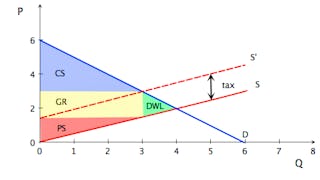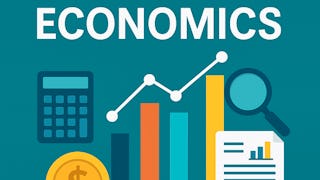Filter by
SubjectRequired
LanguageRequired
The language used throughout the course, in both instruction and assessments.
Learning ProductRequired
LevelRequired
DurationRequired
SkillsRequired
SubtitlesRequired
EducatorRequired
Explore the Managerial Economics Course Catalog
 Status: Free Trial
Status: Free TrialUniversity of Illinois Urbana-Champaign
Skills you'll gain: Descriptive Statistics, Supply And Demand, Market Dynamics, Sampling (Statistics), Statistical Inference, Business Analytics, Bank Regulations, Financial Systems, Financial Policy, Banking, Probability Distribution, Statistical Analysis, Statistics, Regression Analysis, Data-Driven Decision-Making, Microsoft Excel, Statistical Methods, Probability & Statistics, Economics, Statistical Hypothesis Testing
 Status: Free Trial
Status: Free TrialIllinois Tech
Skills you'll gain: Market Dynamics, Supply And Demand, Game Theory, Economics, Market Trend, Business Economics, Market Analysis, Operating Cost, Business Strategy, Competitive Analysis, Cost Management, Strategic Decision-Making, Decision Making
 Status: Preview
Status: PreviewUniversity of Pennsylvania
Skills you'll gain: Supply And Demand, Economics, Market Dynamics, Market Analysis, Resource Allocation, Policy Analysis, Tax, Consumer Behaviour, Cost Benefit Analysis, Decision Making
 Status: Preview
Status: PreviewUniversity of Virginia
Skills you'll gain: Management Accounting, Cost Accounting, Operating Cost, Cost Benefit Analysis, Cost Management, Budget Management, Financial Accounting, Financial Data, Financial Analysis, Decision Making, Resource Allocation

Alfaisal University | KLD
Skills you'll gain: Economics, Business Economics, Business Management, Decision Making, Business, Strategic Decision-Making, Supply And Demand, Cost Management, Production Management, Production Process
 Status: NewStatus: Preview
Status: NewStatus: PreviewO.P. Jindal Global University
Skills you'll gain: International Finance, Sustainable Development, Game Theory, Business, Market Analysis, Production Process, Strategic Decision-Making
What brings you to Coursera today?

Coursera Project Network
Skills you'll gain: Financial Statement Analysis, Financial Analysis, Return On Investment, Profit and Loss (P&L) Management, Financial Modeling, Performance Metric, Accounting, Finance, Operating Expense, Investments
 Status: Preview
Status: PreviewYale University
Skills you'll gain: Investment Banking, Risk Management, Financial Market, Financial Regulation, Financial Services, Finance, Business Risk Management, Securities (Finance), Capital Markets, Behavioral Economics, Banking, Corporate Finance, Governance, Insurance, Underwriting, Derivatives, Market Dynamics, Mortgage Loans
 Status: Preview
Status: PreviewIIMA - IIM Ahmedabad
Skills you'll gain: Strategic Thinking, Game Theory, Behavioral Economics, Business Strategy, Strategic Decision-Making, Complex Problem Solving, Problem Solving, Strategic Leadership, Critical Thinking, Decision Making, Market Dynamics, Organizational Change, Business Analysis, Economics, Digital Media Strategy, Market Opportunities, Negotiation, Risk Management, Mergers & Acquisitions, Innovation
 Status: Free Trial
Status: Free TrialRice University
Skills you'll gain: Business Economics, Market Dynamics, Economics, Game Theory, Supply And Demand, Operating Cost, Cost Benefit Analysis, Market Analysis, Consumer Behaviour, Policty Analysis, Research, and Development, Decision Making

University of Illinois at Urbana-Champaign
Skills you'll gain: Data Storytelling, Management Accounting, Fund Accounting, Operations Management, Mergers & Acquisitions, Financial Statement Analysis, Marketing, Risk Management, Machine Learning Algorithms, Business Strategy, Revenue Recognition, Financial Auditing, Descriptive Statistics, Process Improvement, Variance Analysis, Generative AI, Financial Market, Strategic Decision-Making, Corporate Tax, Organizational Change
 Status: Free Trial
Status: Free TrialRice University
Skills you'll gain: Economics, Supply And Demand, Business Economics, Market Dynamics, Economic Development, Game Theory, Financial Policy, Tax, Market Analysis, International Relations, Operating Cost, Cost Benefit Analysis, Business Metrics, Public Policies, Performance Metric, International Finance, Fiscal Management, Consumer Behaviour, Investments, Labor Relations
Managerial Economics learners also search
In summary, here are 10 of our most popular managerial economics courses
- Managerial Economics and Business Analysis: University of Illinois Urbana-Champaign
- Managerial Economics: Buyer and Seller Behavior: Illinois Tech
- Microeconomics: The Power of Markets: University of Pennsylvania
- Managerial Accounting Fundamentals: University of Virginia
- الاقتصاد الإداري | Managerial Economics: Alfaisal University | KLD
- Business Economics: O.P. Jindal Global University
- Profit Analysis using Economic Value Added: Coursera Project Network
- Financial Markets: Yale University
- Strategy and Game Theory for Management: IIMA - IIM Ahmedabad
- Principles of Economics: Microeconomics - Down to Business: Rice University










